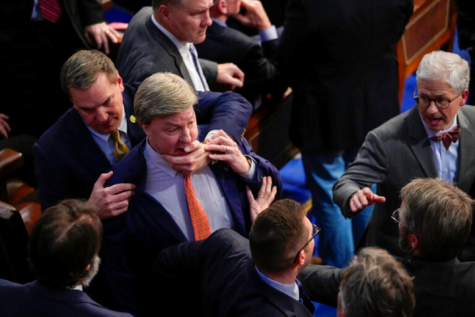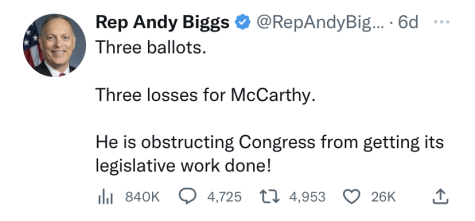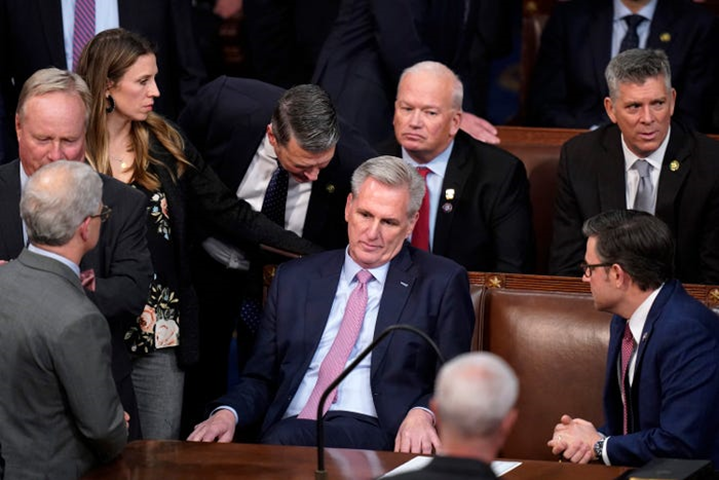A House Divided
January 11, 2023
After weeks of assiduous negotiations between GOP defectors and fifteen rounds of voting held over 5 days, Republican leader Kevin McCarthy of California has finally been elected speaker of the United States House of Representatives. Until the 216-212 vote on Saturday, January 7, the most recent instance in which the House failed to elect a speaker on the first ballot was in 1923, when the 68th Congress required nine ballots to elect Republican Representative Frederick Huntington Gillett of Massachusetts. Gillett faced rejection from the progressive wing of the Republican party, but eventually secured the majority tally that had been cast on the ballot of 215 votes. In fact, other than Gillett’s nine rounds of voting, the Speaker of the House election has not required multiple ballots since before the Civil War, when the country was in a state of political turmoil due to division over the issue of slavery.

In recent decades, we have seen members of the majority party voting “present,” which means the lawmaker lowers the overall tally—historically, this is 218 votes out of the 435 elected members—needed to reach a majority of ballots cast, or members from smaller factions vote for someone other than their party nominee. In the first ballot, 19 House Republicans voted for a Republican other than McCarthy, with Matt Gaetz of Florida spearheading the effort and voting for Andy Biggs of Arizona along with eight other Republicans. In the second and third rounds of voting, the same 19 Republicans (and an additional Republican during the third vote) supported Representative Jim Jordan of Ohio, a member of the conservative House Freedom Caucus who has supported Donald Trump’s false claims that the 2020 election was stolen. Biggs took his complaints about McCarthy and the prolonged election to Twitter: “Three ballots. Three losses for McCarthy. He is obstructing Congress from getting its legislative work done!” During the chamber’s fourth, fifth, and sixth votes, Representative Byron Donalds of Florida emerged as an alternative to McCarthy for 20 Republicans, and Victoria Spartz of Indiana voted “present.” McCarthy continued to lose support in the seventh through 11th ballots; Matt Gaetz cast three votes for Trump and Lauren Boebert and seven other Republicans backed Kevin Hern of Oklahoma, the chairman of the Republican Study Committee. When voting resumed for the 12th round, a major shift occurred. 14 GOP hardliners finally switched in favor of McCarthy, and the final tally was 213. In the 13th round, he still fell short of the 216 votes he needed to be elected House speaker. After again failing to secure speakership in the 14th round, tensions rose when McCarthy confronted Matt Gaetz on the House floor. Gaetz voted “present,” denying McCarthy the final vote required for him to become speaker. Mike Rogers of Alabama lunged at Gaetz and had to be restrained by Richard Hudson of North Carolina, scenes showing the fracturing between the hardliners and more moderate members of the GOP. On the 15th and final round of voting, six Republicans, including Gaetz, voted “present,” allowing McCarthy to win the majority of votes. Throughout the entire election process, all 212 House Democrats voted for House Minority Leader Hakeem Jeffries of New York.

The effort to prevent McCarthy from being elected House speaker by the opposing lawmakers in the chamber reflects the chaotic state of the fractured Republican party across the nation. Governing with a party wing as adamant as Gaetz’s faction will not get any easier for McCarthy, who seems to have made a multitude of concessions to hardliners in order to secure the speakership. Following the 2020 election and the January 6 insurrection at the U.S. Capitol, Republicans have become divided over Trump’s politics and whether it is to blame for the disappointing midterm election results or crucial to wins in the future, thus creating splits over who should lead the Republican party. Matthew Rosendale of Montana has asserted that McCarthy wants to “maintain the status quo” and avoid confronting issues like government spending or election fraud, while Bob Good of Virginia states that McCarthy is not fighting enough for the Republican agenda. Similarly, Anna Paulina Luna of Florida opposes McCarthy because his negotiations have been “insufficient.” This stalemate has caused televised embarrassment of GOP leaders and an era of disunited government. With two loud factions vying for influence, McCarthy faces challenges in governing with a controversial legislative agenda and divided Republicans.







